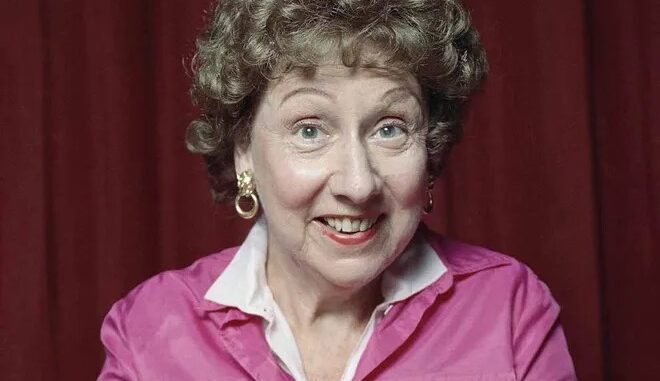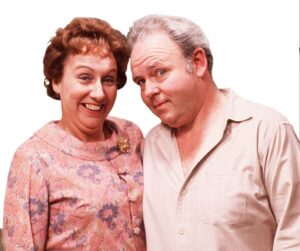
Jean Stapleton was a character actress who played Archie Bunker’s far better half, the sweetly naive Edith, in the groundbreaking 1970s US comedy All in the Family.
Little known previously, she co-starred with Carroll O’Connor in the top-rated CBS comedy about an unrepentant bigot, the wife he churlishly but fondly called “Dingbat”, their daughter Gloria and liberal son-in-law Mike, or “ Meathead”.
She received eight Emmy nominations and won three times during her eight-year tenure. Produced by Norman Lear, the series broke through the timidity of US TV with social and political jabs and was the No 1-rated program for an unprecedented five years in a row.
Lear, who went on to create a run of socially conscious comedies, said, “No one gave more profound ‘How to be a Human Being’ lessons than Jean Stapleton.” She also earned Emmy nominations as Eleanor Roosevelt in the 1982 film Eleanor, First Lady of the World and for a guest appearance in 1995 on Grace Under Fire.
Her films included two by Nora Ephron, the 1998 Tom Hanks-Meg Ryan romance You’ve Got Mail and 1996’s Michael starring John Travolta. She turned down the chance to star in Murder, She Wrote, which became a showcase for Angela Lansbury.
The theater was Stapleton’s first love and she compiled a rich resume, starting in 1941 as a New England stock player and moving to Broadway in the 1950s and ’60s. In 1964 she originated the role of Mrs Strakosh in Funny Girl with Barbra Streisand, while other musicals and plays included Bells Are Ringing, Rhinoceros and Damn Yankees, in which her performance – and the nasal tone she later used in All in the Family – attracted Lear’s attention and led to his auditioning her for the role of Archie’s wife. “I wasn’t a leading lady type,” she said. “I knew where I belonged. And actually, I found character work much more interesting than leading ladies.”
Edith, of the dithery manner, cheerfully high-pitched voice and family loyalty, charming viewers but was viewed by Stapleton as “submissive” and, she hoped, removed from reality. She said she didn’t think Edith was a typical American housewife – “at least I hope she’s not. What Edith represents is the housewife who is still in bondage to the male figure, very submissive and restricted to the home. She is very naive, and she kind of thinks through a mist, and she lacks the education to expand her world. I would hope that most housewives are not like that.”
She founded Archie with her malapropisms – “You know what they say, misery is the best company” – and her open-hearted acceptance of others, including her beleaguered son-in-law and African-Americans and other areas Archie disdained.
Stapleton had the chance to offer a deeper take on Edith, who faced tribulations such as a breast cancer scare and the menopause. She was proud of the show’s political edge, citing an episode about a draft dodger who clashes with Archie as a personal favorite.
But she worried about typecasting, rejecting any roles in commercials or sketches on variety shows that called for a character similar to Edith. Despite pleas from Lear not to let Edith die, she left in 1980. In Archie’s Place, Archie carried on as a widower. Stapleton proved her own toughness when her husband of 26 years, William Putch, suffered a fatal heart attack in 1983 at 60 while the couple was touring with a play directed by Putch. Stapleton went on stage that night and continued with the tour. “That’s what he would have wanted,” she said.
Born in New York, Stapleton worked as a secretary before studying acting with the American Theater Wing and others. She had a long working relationship with the playwright Horton Foote, starting with 1944’s People in the Show and continuing through to the 2000s. Her early TV career included appearances on series such as Dr Kildare.
She and Putch had two children, John and Pamela, who followed their parent s into the enter tainment industry.
